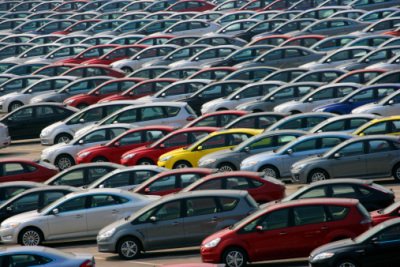Japanese Automakers Fear New Outbreak of Anti-Japan Sentiment in China

Their sales in the world’s No. 1 market plunged amid a violent public backlash against Japanese cars following a territorial row between Tokyo and Beijing. Their market share has yet to recover.
Unfortunately for the Japanese automakers, that not-so-distant history of Japan bashing may soon repeat itself. This August marks the 70th anniversary of the end of World War II. Domestic media in Japan already are fretting that Chinese consumers will sour again on Japanese brands as the two countries commemorate the war’s end.
Another backlash could be devastating for Japanese brands because their sales in China already significantly lag behind other markets, notably North America and Southeast Asia. Indeed, they are only slowly making up lost ground in China.
“We practically lost two years in our development in China,”Nissan Motor Co. CEO Carlos Ghosn told a small group of reporters last week. “Since these events, we consider that there [are some] consumers in China, for a lot of reasons, who would never consider a Japanese brand.”
Reasons to worry abound, as the anniversary of Japan’s Aug. 15, 1945 surrender approaches.
China’s government has a knack for holding foreign businesses hostage to its political agenda. And it infamously keeps public opinion on a short leash until the rabble-rousing suits its interests. The war’s end is a perfect platform to pontificate about Japan’s attitude toward its past.
Meanwhile, Japan’s conservative Prime Minister Shinzo Abe has done little to help the cause. He toes a hard line against China on several issues, including the territorial dispute over the rocky islands in the East China Sea that triggered the first backlash in 2012. But he also is criticized by some as being less than fully repentant for Japan’s role as an aggressor in World War II.
Earlier this month, a group of 200 Western historians penned an open letter to Abe urging him to more forthrightly address Japan’s wartime past, when its army occupied large parts of China.
But a standoff could be brewing. Japanese media reported Abe plans to refrain from including any apology in his statements to mark the end of the war, though a final decision is pending.
Meanwhile, Abe’s wife fanned tensions last week by visiting Tokyo’s controversial Yasukuni Shrine, which is dedicated to Japan’s war dead, including some executed Class A war criminals.
Such visits are always a flashpoint for neighboring nations such as China and Korea.
Predictably, China condemned the move and called for Japan to “face up to” its history.
“We once again urge the Japanese side to face up to, and deeply reflect upon, its history of aggression and make a clean break with militarism,” China Foreign Ministry spokesman Hong Lei told reporters, according to Agence France Presse.
Abe himself reportedly has not visited since 2013, but conservative constituents in Japan may pressure him to do so in the runup to August. That could open the door for more recriminations in China.
With emotions guaranteed to run even higher during the countdown to the anniversary, Japan’s carmakers will be watching nervously to see whether they pay the price for a war long over.
Related News


